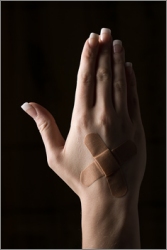The Four Most Dangerous
Allergies and How to Prevent Them
by www.SixWise.com
Over 54
percent of Americans have allergies, and for most of them
these result in inconvenient and uncomfortable symptoms like
sneezing, congestion, watery/itchy eyes, and a runny nose.
But for some allergy sufferers -- estimates say as many as
40 million -- exposure to an allergen can cause a potentially
life-threatening reaction called anaphylaxis.
|

Food allergies are one of the most common causes of
life-threatening anaphylaxis.
|
As much as 15 percent of the U.S. population may be at risk
of severe allergies, or anaphylaxis, according to a study
in the Archives of Internal Medicine.
Allergies occur when your immune system overreacts to a substance
that normally shouldn't cause a reaction. The event sets off
a chemical chain reaction, namely the release of histamine,
that leads to allergy symptoms (typically wherever the histamine
is released). In people with severe allergies, however, the
reaction impacts your entire body, and the histamine can cause
your blood vessels to dilate and your blood pressure to decrease.
Your throat may also become swollen, blocking your ability
to breathe.
Along with trouble breathing, wheezing, hives, itching and
a weak or rapid pulse, your can also feel faint, dizzy, or
nauseous during an anaphylactic reaction. Further, because
the event can stop your breathing or your heartbeat, it can
be fatal within minutes.
Although anaphylaxis can be triggered by a number of allergens,
a handful appear to be much more dangerous.
Which Allergies are the Most Dangerous?
|
Got Food Allergies? Get The Food
Allergy Survival Guide Book!
For a complete guide on how to eat if you have food
allergies and intolerances, check out the highly recommended
Food Allergy Survival Guide Book. In it you'll learn:
- How to avoid the foods and ingredients that trigger
reactions
- How to substitute healthful ingredients for those
that trigger allergic responses
- How to meet recommended nutrient intakes while avoiding
trigger foods such as dairy products, eggs, gluten-containing
grains such as wheat, or other food culprits
- How to determine which food(s) may be triggers for
your symptoms ... and much more!
|
There are four major allergy groups that are most likely
to trigger a life-threatening reaction. They are:
-
Food
-
Insect stings
-
Drugs
-
Latex
In rare cases exercise can also trigger anaphylaxis.
Preventing these allergies, of course, means avoiding the
triggers, something that is not always easy.
Fighting food
allergies, for instance, can be tricky as hidden ingredients,
particularly wheat and peanuts, can be anywhere. Be sure to
read food labels carefully. To make things a bit easier, the
Food and Drug Administration requires that the top eight food
allergens -- peanuts, eggs, milk, shellfish, wheat, tree nuts,
soy and fish -- must be clearly stated on food labels.
Meanwhile, if you eat out anywhere (from your neighbor's
house to your school cafeteria) let the server or cook know
that you absolutely cannot have certain ingredients.
Also, be sure to check out The
Food Allergy Survival Guide Book, our top-recommended
source for anyone with food allergies. You'll learn what your
food triggers might be, how to avoid them, easy-to-use alternatives,
and even great-tasting allergen-free recipes.
To best avoid stinging insects, be extremely cautious if
they're nearby, but do stay calm, move slowly away and resist
slapping at it. You can somewhat discourage bees, wasps and
hornets from coming near you by wearing long-sleeved shirts
and pants, avoiding wearing bright colors and not wearing
perfume and cologne.
Also, if you're picnicking outdoors, don't bring food out
until you're ready to eat, and cover up high-sugar foods and
drinks (like sodas) that will attract bees. Meanwhile, a quick
spray of all-natural Flea
'n Tick B Gone around your yard or picnic area is a simple
way to keep bees, hornets, wasps and other insects safely
away.
In some cases a series of allergy shots (immunotherapy) may
be able to reduce your body's allergic response to insect
stings and thereby prevent a severe reaction in the future
(this type of therapy is only effective for insect sting allergies).
|

For people with an allergy to latex everyday items
from bandages to rubber bands have the potential to
be deadly.
|
If you have allergies to certain medications, make sure your
doctor and pharmacist are aware of them (remind them before
receiving any medical treatment), and also wear a medical
alert necklace or bracelet that states your specific allergies.
Also make sure your doctor or health care providers are informed
if you have a latex allergy, as the material is common in
rubber gloves, blood pressure cuffs, urinary catheters, tourniquets,
resuscitation equipment and other medical equipment. The best
way to prevent an allergic reaction to latex is to be aware
of which products may contain it, then avoid them as best
you can. Latex is commonly found in:
-
Balloons
-
Dishwashing gloves
-
Waistbands on clothing
-
Rubber toys
-
Pacifiers and baby-bottle nipples
-
Rubber bands
-
Adhesive tape and bandages
-
Diapers and sanitary pads
-
Condoms
If You Have Severe Allergies, Always Keep THIS With You
If you have a severe allergy of any kind make sure you always
carry self-injectable epinephrine (often called an EpiPen)
with you in case of emergency.
"The trouble with these kinds of allergies is that once
the anaphylactic response begins, severe illness or death
can be imminent," said Rachel Miller, MD, a co-author
of the Archives of Internal Medicine study. "These patients
must have auto-injectable epinephrine, like EpiPen, with them
at all times."
Epinephrine, though not always a "cure-all," reduces
the body's allergic response and increases the time someone
in anaphylactic shock has to get to an emergency room for
further treatment.
If you carry an EpiPen with you, make sure it has not gone
past its expiration date (which may make the medication ineffective),
and be sure you and your close family (and friends) know how
to administer it correctly in case of an emergency.
Recommended Reading
Food
Allergies Last Longer Than They Used To: Food Allergy Facts
You Need to Know
50%
of U.S. Population Has Allergies, Most Don't Realize It &
Suffer Unnecessarily ... Do You?
Sources
MayoClinic.com
Anaphylaxis
Medscape.com
FamilyDoctor.org
Latex Allergy
Archives
of Internal Medicine 2001;161:15-21